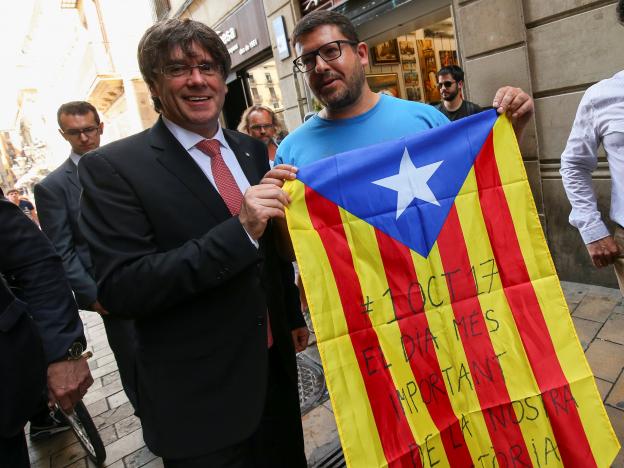President of the Catalonia government announced on Friday that an independence referendum to split from Spain will be held on October amid the fierce opposition of the central government in Madrid.
“The question will be: ‘Do you want Catalonia to become an independent state in the form of a republic’,” Carles Puigdemont said.
He said attempts to agree a date and the wording of the question with Madrid – which is vehemently opposed to allowing Catalonia to split from Spain – failed and left him with no other choice than moving unilaterally.
“We have always made very diverse offers and all of them have been rejected without any exception,” Puigdemont said.
Previous secessionist challenges in Catalonia – a wealthy, 7.5-million-strong region with its own language and customs – were blocked by Spain’s conservative government and the Constitutional Court.
The announcement of the referendum will set the stage for months of confrontation with the central government, which says such a vote is illegal and must not take place.
The Spanish government will block any attempt to further an independence process in Catalonia, spokesman Inigo Mendez de Vigo said.
“Any move that evolves from an announcement to a fact will be appealed by the government,” Mendez de Vigo told a news conference.
“That referendum will not take place because it is illegal.”
The Catalan government has yet to formally sign off on its announced referendum.
Under Article 155 of Spain’s constitution, Madrid has the power to intervene directly in the running of Catalonia’s regional government, forcing it to drop the vote.
This could involve sending in the police or suspending the regional government’s authority to rule.
This is widely seen as a last resort move, however, and many analysts believe the clash will instead culminate in regional elections in Catalonia.
Separatist politicians in the northeastern region have tried for years to win approval from Spain’s central government for a vote like Scotland’s 2014 referendum on independence from Britain, which resulted in a “no” vote.
And while Catalans are divided on the issue, with 48.5 percent against independence and 44.3 percent in favor according to the latest poll by the regional government, close to three-quarters support holding a referendum.
But Catalan authorities have repeatedly been thwarted in their attempts to hold such a vote, arguing it goes against the constitution and would threaten the unity of Spain.
In 2014, Catalonia held a non-binding vote under then president Artur Mas, in which more than 80 percent of those who cast a ballot chose independence, although just 2.3 million out of 6.3 million eligible voters took part.
But in holding the symbolic referendum, Mas went against Spain’s Constitutional Court, which had outlawed the vote — even if it was non-binding.
He was later put on trial and banned from holding office for two years.
Puigdemont, though, still wants to go ahead, and he wants his referendum to be binding this time — even though Madrid has pledged to be just as tough this time round.
